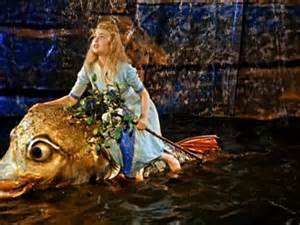I have often returned home to realise that my family after a days normal viewing have adopted a faint Australian and American accent which linguists would argue places them somewhere between Ramsey Street and Central Perk.
Looking back to my childhood television viewing in the late 1960's and early to mid 1970's has made me realise that in fact there were as many overseas series then as now, if not more.
Amongst my favourites were The Flashing Blade, Belle and Sebastien, The White Horses and Robinson Crusoe predominantly dubbed in dodgy English over French. These were good, easy going stories revolving around, respectively, swashbuckling chevalier fighting, mountain rescue, equestrian pursuits and shipwreck on a desert island.
It would be difficult to read anything more into the tales than the facts presented at face value.
That was until the emergence into prime time children's viewing of a series called "The Singing Ringing Tree" on the BBC in 1962 and rolling out at numerous times over the next two decades.
Made in the then Communist East Germany in 1957 it was a Fairy Tale centred on a tree with magical powers together with the key standard ingredients of heroine, hero, and arch-villain engaged in fantastic and perilous adventures involving freakish creatures including an oversized dewy eyed goldfish and a white horse (or possibly a unicorn-I cannot quite remember).
It is not clear which individuals in the BBC Purchasing Department thought it a good idea to buy in a programme from behind the Iron Curtain.
In the style of the Brothers Grimm the Singing Ringing Tree was packed full of hidden messages, political doctrine, moralistic and egalitarian ideals and as such had proven to be very popular in its country of origin although was, before coming to Britain, actually withdrawn from broadcast by the Communist Authorities.
The heroine was a haughty and aloof Princess who was detached from the people, selfish and vain but who became beautiful and beloved through being kind to animals and those in trouble.
The hero, the archetypal handsome hulk was turned by a curse into a most unconvincing grizzly bear in what can only really be described as a brown, shaggy onesie suit.
Their epic battle is against an evil and scheming dwarf who was most menacing in demeanour and motives.
In the Soviet Bloc there had been a directive by Stalin to keep the people feeling happy and engaged in the State even if not actually so. He saw positives in promoting traditional stories in spoken word, singing or acting to engender utopianism and joyous togetherness amongst the great diversity of a communist empire. Even better, a fairy tale could be a cover for political messages and to mould and control young minds.
So what did British children make of the fairy tale/propaganda/subversive aspects of the Singing Ringing Tree?
I was both enthralled and terrified in equal proportions at the 3 part version of the original DDR film when aired across tea time on school nights especially in the winter months when at 5pm it was very dark outside.
This soon became a bit of an obsession, a bit like staring at a dead animal carcass in the road or picking at a crusty scab on a cut knee, very much bordering on mental disturbance.
The original production was in glorious colour but as my family did not own a colour television until 1985 I can only visualise the images and action in graphic black and white. This perhaps accentuated the stark communist message contained in the gradual awakening of the Princess to a social conscience and the conflict against a fascist dwarf. In some respects the programme was rude, crude and lewd but also emotionally touching and with an ultimate redemption for the righteous and just.
Getting on with my life as a responsible adult I often put the experience of watching the Singing Ringing Tree well at the back of my mind.
However, whenever in a group of my peers it is never too long before we begin to speak in hushed tomes about the collective consciousness generated by exposure to this programme. Many of my contemporaries, now in their early 50's appear not a little traumatised by what started off as an innocent bit viewing over a typical weekday tea of baked beans or spaghetti hoops. I can see the signs in the form of a bit of a nervous twitch or a furtive search for activity in the street or across a crowded public bar which could announce the imminent arrival of the State Secret Police.
The very strange goldfish
 |
What a lovely couple

No comments:
Post a Comment